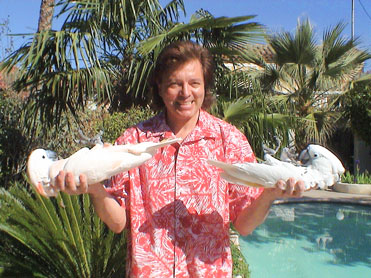
Parrot keeping

 |
Parrot keeping |
 |
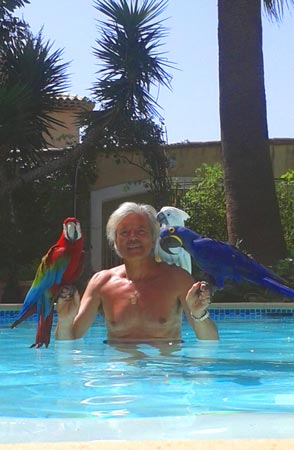 |
| Free parrots - Parrot-stands inside and outside - Aviary and cages - Contact us | ||||||||
Partial or complete reproduction of the following text is allowed with the following source: Mark STEIGER, Cannes (www.ParrotShow.biz) |
||||||||
If you think you have the money, the space and the time for a parrot, then you better choose a horse. It costs about the same price, occupies the same place and requires the same time as such a bird, but you're probably happier with it. However, if you are looking for a loyal friend, adopt a dog! For decoration goldfish are much more appropriate. But if you need companionship above all, then you found the best a family! During his shows Mark Steiger discourages of parrot keeping for individuals. He explains the character and the high demands of these wonderful birds: no submission and little obedience, very noisy and destructive, psychological vulnerability (stress), high space requirements, constant presence of the owner, costly structures (aviaries), maintenance and daily cleaning of the aviary and cages, danger of flying away, etc. It is a sad fact that many expensive paid parrots are sold or given away after a short time. Common excuse: strong feather allergy! Look at the ads in the newspapers. Formulated somewhat more honest: the constant, piercing cries and feeling pity for the poor animal suffering from boredom in the small cage and the lack of a partner. The statutory provisions Laws such as the CITES ("Convention de Washington" and "Arrêté de Guyane" in France) help to preserve protected species but the individual suffering of parrots is not considered. Unprotected species can be unpunished handled in merciless manner. Imagine the enormous suffering of an African Grey, brutally captured in the jungle, separated from his partner, transported under the worst conditions and ultimately forced to end his long life locked in a small cage. If he cries in his misery, he is imprisoned by its owner additionally in the dark! It is obvious that parrot keeping should not be bound to a certificate of competence, but on an official application for most species which is monitored with regular visits by the competent veterinary services or members of animal welfare. The housing conditions (minimum size of the aviary, lighting, ventilation, etc.) must be regulated and controlled. Keeping of only one bird should not be allowed (with exceptions for certain individual birds). The purchase of a parrot Being the "owner" of a parrot For this reason, the best relationship and cohabitation with a parrot results in a friendly relationship without domination and subordination. Imagine a similar relationship as with your neighbours: you do not give them orders and you do accept none of them! The worst relationship with a parrot is the one in which the bird is "fixed" to its owner and even considers him as a sexual partner. No man can be married to a bird without causing him a deeply unhappy life. Always keep this distance! Free flight and trick-training At the same time - if the parrot is not already gone and lost - it becomes more aggressive and uncooperative for training. When the young parrot flies obediently on your arm when you call him, he does so because he wants to come to you, but not because he obeys you! Up to sexual maturity, which can vary in several years depending on the species, he will follow you easily. Afterwards you will experience the inevitable surprise that the bird is only at his own will. Sometimes he comes, but more often he won't! For this reason, most birds in parrot shows are very young. They are replaced with the sexual maturity against juveniles. It's a real sadness for those abandoned "artists", from now on they are permanently locked in bird cages. "Trained" Parrots are conditioned to their tricks and tests, they do not obey their trainer. Free flight with adult parrots is possible only under rare conditions. Free flight must not be confused with free detention! Keeping parrots free is not difficult if the birds have a huge area without dangers (predators, traffic, thieves, etc.). The parrots can fly freely and will hardly leave their territory, but return regularly to feed. An adult parrot is certainly more able to perform difficult tricks and tests (i.e. intelligence tests) as a young bird, but it is much more difficult for the trainer to guide him and to perform in shows or in TV. Mark Steiger's parrots are all grown up, they are between ten and about sixty years old. Not always an easy task!
Do you have to go to a specialist or buy DVDs or books to train your parrot? A parrot is not a lifeless machine and it is impossible to apply the same rule and education to each individual. With the wrong method in inexperienced hands the animal may suffer terribly. Moreover, it is absolutely unnecessary for a parrot to be able to ride a bike or to solve puzzles. It's enough if he lives happily.
The talking parrot The spoken phrases or sayings are made of several short words putted together. With all the individual words in a saying, you can actually claim that he manages to say many words. But in reality he has only a few terms in a fixed context, it is not an independent vocabulary. Whistling or imitating sounds (cat, dog, doorbell, etc.) are easier than talking. Mark Steiger: "The big challenge is that the parrot speaks on command and before an audience - without being locked in a cage. I have three talkers in my show but my best one is not demonstrating his talent on stage. Yet at home he pronounces numerous words and expressions. Like most parrots he speaks unfortunately only when he wants to and not on command. African Greys and Amazons imitate women's and children's voices easier. These two species also have the reputation of being the most talented talkers. Obviously there are less people with tame macaws to compare properly. The voice of the parrot depends very much on its physical size. Small cockatoos and parakeets often speak with a "telephone voice", which is hard to understand. Luna, Mark Steiger's female Hyacinth Macaw, imitates with a very deep bass voice. There are teaching methods (DVD, books) who claim to deliver the secret for a talking parrot genius - another way to make money without providing a controllable result! It is impossible to predict the necessary time of learning to pronounce a saying or sound. It varies between a few seconds to several months - and even never! In some shows talking parrots are presented with playback! The spectators do not really hear the voice of the parrot on stage, apparently speaking into a microphone, but in reality that of a hidden person. Aviary and Cage The free keeping in a limited garden is not so easy to achieve, and it happened that parrots have flown away. Mark Steiger has always found them by calling and by their responding cry for help. And that even over hundreds of meters. This complicity between the trainer and the birds is the result of years of intense work and passion. If you do not have a lot of time and patience to devote to parrots do not expect a good result and give up! You can save yourself a lot of worry and most of all unnecessary suffering to your pets. For a good cage must be calculated with the same budget as for the parrot. The larger the cage, the better. The parrot should not be locked up all day, it would be a torture!
The dangerous and noisy parrot Exactly as with the trick training and the free-flight the friendly parrot completely changes character from one day to the other! From sexual maturity on- which varies depending on the species of several years -. it can get awfully aggressive! ! A greenwing, hyacinth or even smaller macaw can slice off a human finger. An adult parrot can seriously injure but tamed he will not bite his trainer if this one is able to interpret behaviour and does not commit errors. To show his displeasure normally a painful pinch will happily be the maximum. Cockatoos are less aggressive in general, but they can also be dangerous. they mostly have the great disadvantage of being extremely noisy, unbearable screams for hours - this is not a joke! By the way: a parrot who screams absolutely never has probably reached a breathing problem and is sick! Behaviour disorders and diseases Should we consult a behaviourist for pets? Here again - as with the parrot training - in many cases it is a good way for the "specialist" to earn good money from desperate parrot keepers without providing a controllable result. Does Mark Steiger give advice on parrot keeping and "behavioural disorders" (both from the animal or the owner as well :)! )? Mark Steiger's educational and amusing show makes it clear to viewers that parrots do not fit the usual image of a comic clowns. They are a very delicate, highly sensitive animals and can even be dangerous. |
| Sun-bath and ……. | back |
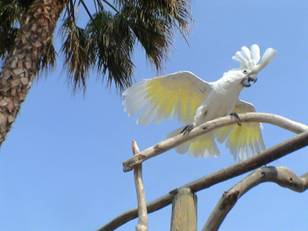 |
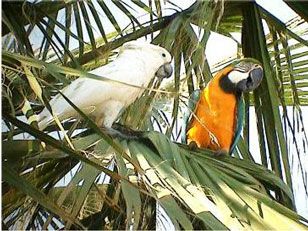 |
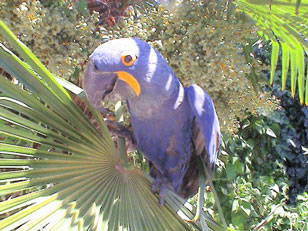 |
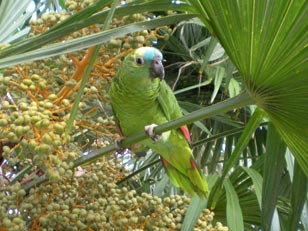 |
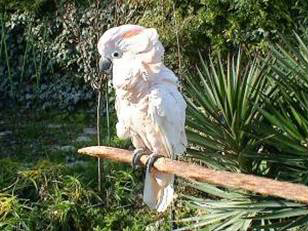 |
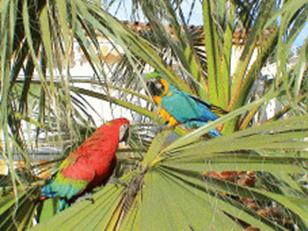 |
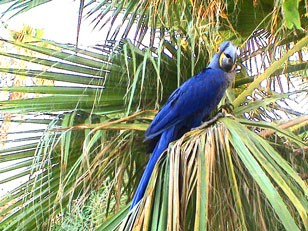 |
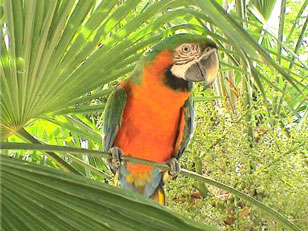 |
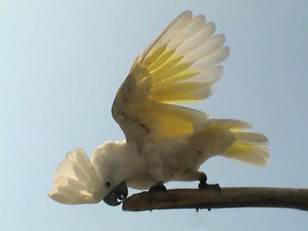 |
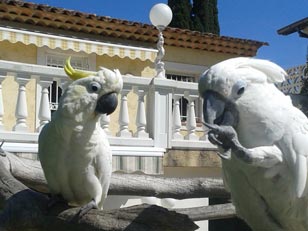 |
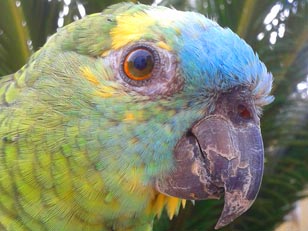 |
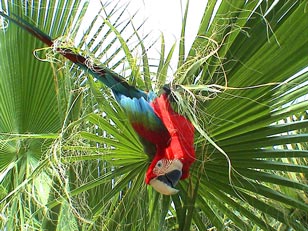 |
....shower in the rain (parrots love rain) |
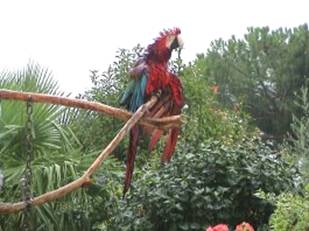 |
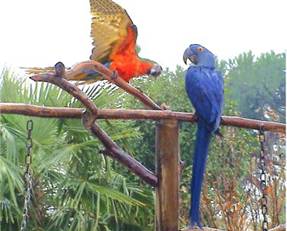 |
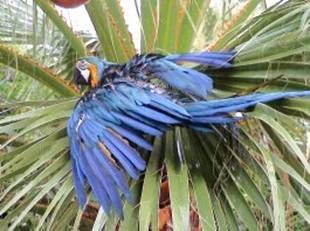 |
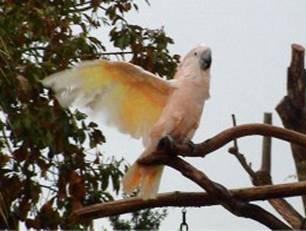 |
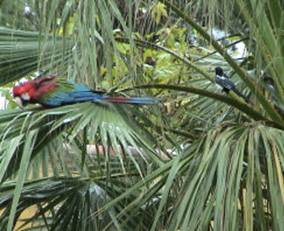 |
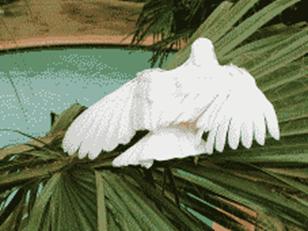 |
| back | ||
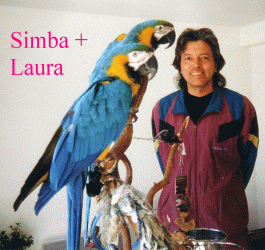 |
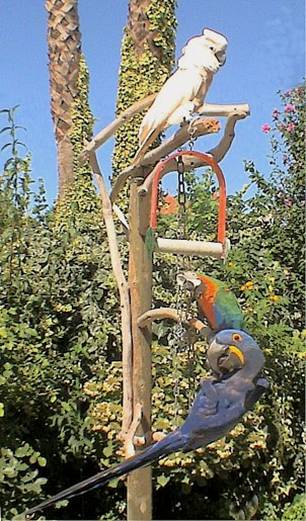 |
|
| back | |
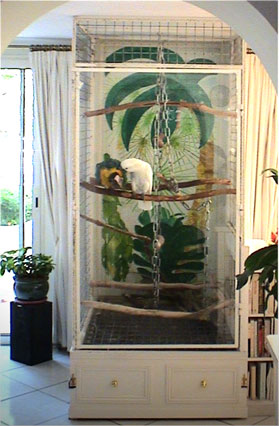 |
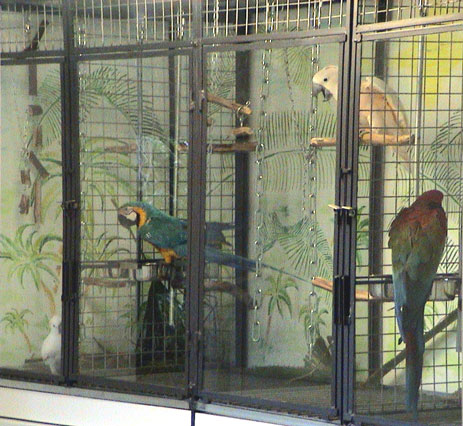 |
|
|
Mark Steiger "Le Tour du Monde" 9, rue de Cannes 06150 Cannes (FRANCE)
Phone: 0033-(0)6 09 84 05 07
|
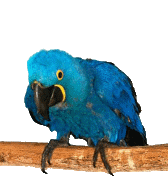 |
||
| back |